Ticodendron incognitum is the only species of Ticodendron, and the only member of the family Ticodendraceae. It is most closely related to the family Betulaceae.
Koanophyllon is a genus of plants in the family Asteraceae. They are perennials and shrubs and are native to South America, Central America, the West Indies, Mexico, with a few species range extending into the United States. The flowers are white to pinkish.
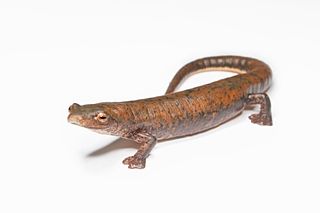
The Cocle salamander, also known as the Cocle mushroomtongue salamander, is a species of salamander in the family Plethodontidae. It is found in Costa Rica and Panama. In Costa Rica, it is only known from the southeastern part of the country on the Atlantic versant, whereas in Panama it is more widespread and occurs also on the Pacific versant. Its natural habitats are humid lowland and montane forests. It is a common species in Panama, whereas it is only known from a single specimen in Costa Rica. It is threatened by habitat loss.
Acer yangbiense is a species of maple with a very restricted distribution in Yunnan, China, only known from around ten specimens from a single locality on the western slope of Mount Cangshan in Yangbi County.
Hopea recopei is a species of plant in the family Dipterocarpaceae. It is found in Cambodia, Laos, Thailand, and Vietnam.
Protium panamense is a species of plant in the Burseraceae family. It is found in Costa Rica and Panama. It is becoming rare due to habitat loss.

Quercus hintoniorum is a species of oak. It has only been found in the northeastern Mexican states of Coahuila and Nuevo León.
Quercus planipocula is a species of oak. It is native to western Mexico in Sinaloa, Nayarit, and Guerrero.
Zamia cunaria is a species of plant in the family Zamiaceae. It is endemic to the Cuna Yale area of Comarca de San Blas Province, Panamá. It is common around Llan Cartis Road and Kuna Llala.
Zanthoxylum panamense is a species of plant in the family Rutaceae. It is found in Costa Rica, Honduras, and Panama.
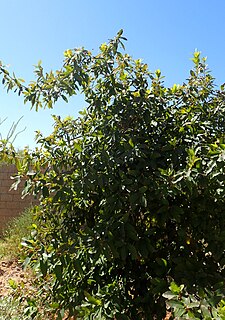
Quercus polymorpha, the Mexican white oak, Monterrey oak or netleaf white oak, is a North American species of oak. It is widespread in Mexico, Guatemala, and Honduras, and known from a single population in the United States but widely planted as an ornamental.

Yucca coahuilensis is a plant in the family Asparagaceae, native to grasslands of southern Texas and northern Coahuila. It has a basal rosette of stiff, very narrow leaves, and an inflorescence up to 2.5 m tall, bearing creamy white flowers.
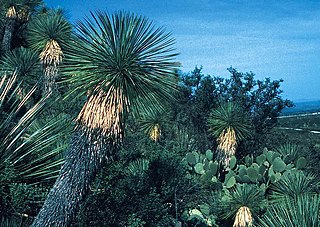
Yucca linearifolia is a plant species in the family Asparagaceae, native to the Chihuahuan Desert in the Mexican states of Coahuila and Nuevo Leon. It is a tree-like perennial up to 3.5 m tall, with narrow, denticulate leaves and fleshy fruits.
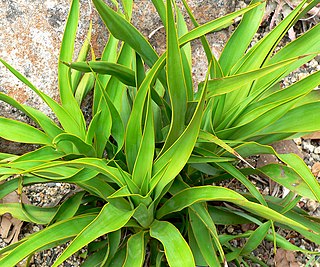
Yucca rupicola is a plant in the family Asparagaceae, known as the twistleaf yucca, twisted-leaf yucca, Texas yucca or twisted-leaf Spanish-dagger. The species was described by George Heinrich Adolf Scheele in 1850. This is a small, acaulescent plant with distinctive twisted leaves. It is native to the Edwards Plateau region of Texas and also to northeastern Mexico.
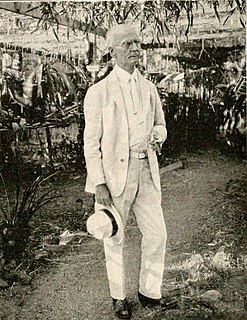
Charles Wesley Powell was an American hobbyist turned horticulturist specializing in the study of orchids (Orchidaceae). He is credited with providing scientists the first large-scale collection of orchid specimens found in Panama. In the early 1900s, he became internationally famous for his new discoveries and valuable contributions to orchidology by gathering, rediscovering, cultivating, preserving, documenting, and submitting-for-study a diverse assortment of hundreds of distinct specimens: yielding many new to science species.
Koanophyllon villosum, the Florida Keys thoroughwort, or abre camino, is a species of flowering plant in the family Asteraceae. It grows in southern Florida, Cuba, the Bahamas, Hispaniola, Jamaica, and the Islas de la Bahía.
Quercus coffeicolor is a species of oak. It is native to Nayarit, Sinaloa, and Jalisco in western Mexico.

Quercus salicifolia is a Mesoamerican species of oak in the beech family. It is native to Central America and to central and southern Mexico, from Jalisco to Panamá.

Quercus sapotifolia is a species of oak in the beech family. It is native to Central America and also to southern and western Mexico, as far north as Michoacán. It is threatened by habitat loss.
Burton's yellow-shouldered bat is a species of leaf-nosed bat found in Panama and Costa Rica.









